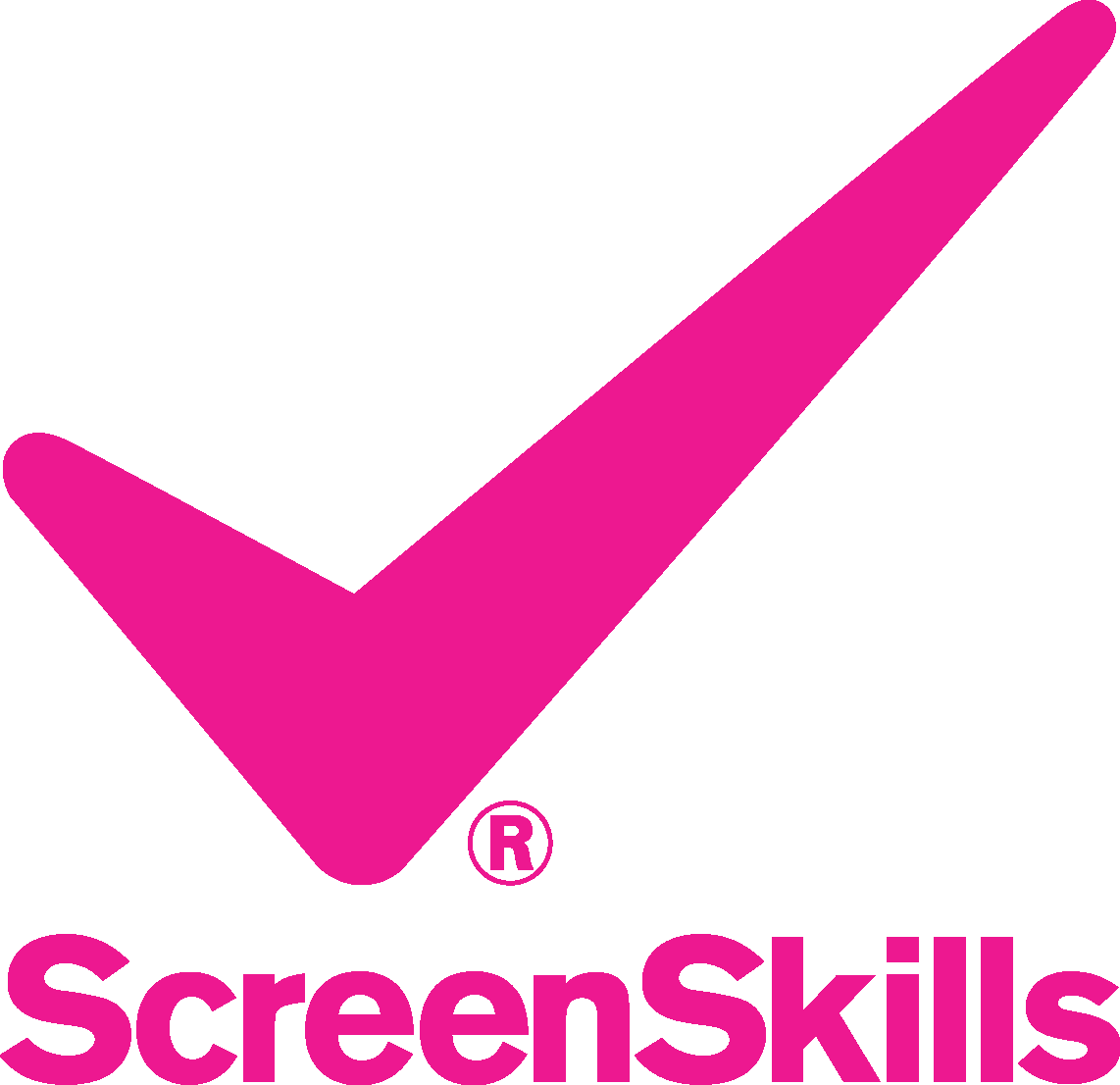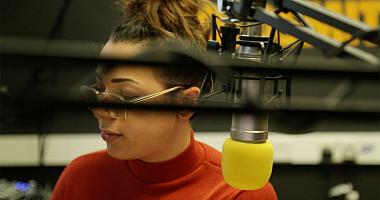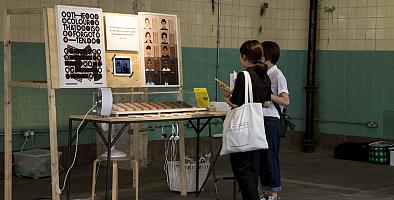MA
Script Writing
Content navigation menu
Why study MA Script Writing at Goldsmiths
The skills of storytelling are timeless. Tackle the creative, analytical and professional sides of script writing for film, television and radio on this industry-accredited Masters.
- Focus on further developing your own feature film, TV or radio project in a workshop-based environment limited to twelve students, ensuring intensive engagement.
- Study on one of the few MA Scriptwriting programmes accredited by ScreenSkills.
- Gain industry exposure by pitching your project to high level industry professionals and having your script read. Attend lectures given by industry professionals, and have your scripts read by professional actors at a Script Showcase, attended by agents and other industry professionals.
- Be supported in finding industry contacts who can encourage and support your development as a scriptwriter.
- Develop script editing and script development skills.
- Study within Goldsmiths’ Department of Media, Communications and Cultural Studies, and hone your craft in a critical, stimulating, and interdisciplinary creative environment.
- The Department of Media, Communications and Cultural Studies has been ranked second in the UK for 'world-leading or internationally excellent' research (Research Excellence Framework, 2021) and 16th in the world (third in the UK) in the 2024 QS World Rankings for communication and media studies.
With myriad new media platforms, there are more opportunities to create content than ever before. And all these require a script and a story. But how do you get your work to industry-standard and in front of the right people?
Industry access
At Goldsmiths, our tutors are all experienced film and TV professionals, and we are able to offer exceptional industry access for our emerging writers.
Over the last four years we've welcomed a broad range of writers, television development executives and film production executives including:
- Internationally acclaimed movie directors Steve McQueen and Mike Newell
- Producer Allan Niblo (founder of Vertigo Pictures)
- James Bowsher and Catriona Renton (senior executives with Good Chaos Pictures)
- Matt Jarvis and Rachael Stephenson from Clerkenwell Films
- BAFTA-winning film producer Martin Gentles
- Acclaimed TV dramatist Jed Mercurio
- Oscar-nominated screenwriter Nick Hornby
- BBC Radio producer Sasha Yevtushenko
- Comedy writer and performer Jamie Demetriou
The questions we explore
The main question you have to ask yourself for this MA programme is: do I really need to be a writer more than anything else? That’s quite brutal, but script writing is a tough profession. You’re totally exposed as a creative person, it’s you and the page and the tradition in which you’re working, and that can be a liberating but also uncomfortable place to be.
The processes we use
The programme is not about learning how to be a writer; it’s about developing and pushing forward your own writing projects as far and as fast as you can in 12 months. You’ll be developing your own voice, learning how to critique the work of others, and getting to grips with marketing your projects. You’ll also be making industry contacts so you can pitch for employment in an extremely competitive industry.
You’ll cover every aspect of the writing process from getting ideas, maintaining productive writing practices and developing characters and storylines, to presenting your work to an industry standard and pitching your ideas. Writing is a lonely business – that’s why the community of writers that the programme gives you is such a creative advantage.
Contact the department
If you have specific questions about the degree, contact Philip Palmer.
Length
1 year full-time
Entry requirements
You will be considered for this programme on the basis of your submitted creative work and your interview. If you are not a graduate you may be asked to show that you have the ability to work at postgraduate level.
Fees
Home - full-time: £10350
International - full-time: £22640
Department
Media, Communications and Cultural Studies

This course is accredited by ScreenSkills.
What you'll study
Every student takes two core modules:
| Module title | Credits |
|---|---|
| Scriptwriting | 90 credits |
| Reflection Essay | 15 credits |
Then choose between Long Form Script (30 credits) or Adaptation and Script Editing (30 credits).
You'll also take option modules worth 45 credits from a list provided annually by the Department of Media, Communications and Cultural Studies.
Note about optional modules (if available): The above is indicative of the typical modules offered, but is not intended to be construed or relied on as a definitive list of what might be available in any given year. The module content and availability is subject to change.
Teaching
This is an MA that really focuses on you as the student. There are lectures, but most of the time you’ll be working one-to-one with a writing tutor or within small group workshops.
We keep the course small deliberately. In this way, we know your individual work and you know other students’ work through the weekly feedback process. We also believe you don’t know who you are until you’re relating to another person, and ultimately this is what scriptwriting is about: making that connection.
How you'll be assessed
You are assessed on your portfolio, which consists of your long-form treatment and second draft feature script or equivalent, your 4,000-word Reflection essay on this script, linked to issues in Media and Culture and a radio script adapted from a source text.
In addition, depending on your options, your portfolio could also include a 10-12 page short script or script-editing proposal and coverage. Other modules are assessed by 5-6,000-word essays.
Entry requirements
You will be considered for this programme on the basis of your submitted creative work and your interview. If you are not a graduate you may be asked to show that you have the ability to work at postgraduate level.
International qualifications
We accept a wide range of international qualifications. Find out more about the qualifications we accept from around the world.
If English isn’t your first language, you will need an IELTS score (or equivalent English language qualification) of 7.0 with a 7.0 in writing and no element lower than 6.5 to study this programme. If you need assistance with your English language, we offer a range of courses that can help prepare you for postgraduate-level study.
How to apply
Apply directly to Goldsmiths using our online application system
Before submitting your application you’ll need to have:
- Details of your academic qualifications
- The email address of your referee who we can request a reference from, or alternatively a copy of your academic reference
- Copies of your educational transcripts or certificates
- A personal statement – this can either be uploaded as a Word Document or PDF, or completed online. Please see our guidance on writing a postgraduate statement
Portfolio
Please include a evidence of your fiction writing abilities in the form of:
- Three one-paragraph ideas for short film projects that you might wish to develop further on the programme.
- Three one-page ideas (single spaced) for feature film and/or TV series projects you might wish to develop further on the programme.
- Plus one of the following:
– A short film script, in standard screenplay format, of 10-12 pages in length (please add a brief summary of the rest of the story if the script is longer than 12 pages)
– The opening 10 pages of a full-length script, in standard screenplay format, together with a summary of the rest of the story.
– A 10-page short story. (Please note you may be asked to demonstrate your ability to write scripts by submitting scenes to a brief defined by the course convenor if you don’t have a “calling card” script yet written).
You'll be able to save your progress at any point, and return to your application by logging in using your username/email and password.
When to apply/deadline for application
Applications open in October and will be considered on a rolling basis from the end of February onwards. There is no deadline for applications, however, you are encouraged to apply early to avoid disappointment.
Interviews
Applicants who are considered suitable for the programme based on their application will be shortlisted to attend an interview. Overseas applicants who can’t attend an interview day are interviewed by Skype.
Find out more about applying.
Fees and funding
Annual tuition fees
These are the PG fees for students starting their programme in the 2024/2025 academic year.
- Home - full-time: £10350
- International - full-time: £22640
If your fees are not listed here, please check our postgraduate fees guidance or contact the Fees Office, who can also advise you about how to pay your fees.
It’s not currently possible for international students to study part-time under a student visa. If you think you might be eligible to study part-time while being on another visa type, please contact our Admissions Team for more information.
If you are looking to pay your fees please see our guide to making a payment.
Funding opportunities
BAFTA Scholarships
UK students offered a place on this course are eligible for the BAFTA UK Scholarships Programme.
Explore the Goldsmiths scholarships finder to find out what other funding you may be eligible for.
Additional costs
In addition to your tuition fees, you'll be responsible for any additional costs associated with your course, such as buying stationery and paying for photocopying. You can find out more about what you need to budget for on our study costs page.
There may also be specific additional costs associated with your programme. This can include things like paying for field trips or specialist materials for your assignments. Please check the programme specification for more information.
Paying your fees
Find out about how to make a payment.
If you are a UK student you may be eligible for a postgraduate loan.
Careers
MA Script Writing is all about the product. So when you complete this Masters, you leave with a whole portfolio of writing, a set of professional skills, a list of industry contacts, and a set of professional friendships through the Goldsmiths Screen School.
The programme gives you a safe, supportive and stimulating environment to unpack your ideas, get constructive feedback, make mistakes, and find the story you want to tell. In the end though, it’s down to you as an individual to become the writer you want to be.
Student work
Film and television
Sian Astor-Lewis
At Goldsmiths we recently hosted a screening of a feature film written and directed by Goldsmiths alumna Sian Astor-Lewis, whose beautifully crafted film 'To Nowhere' received a four-star Guardian review last year.

Karis Kelly
Our recent graduate Karis Kelly, a successful TV and stage writer, has participated in a number of high profile TV writers’ rooms, and has written for the Northern Irish drama ‘Hope Street’. Her short film ‘The Break’ was filmed by BBC Northern Ireland soon after she graduated from the Masters.

Anil Kizilbuga
One of our international students, Anil Kizilbuga, is enjoying a highly successful career as a screenwriter in Germany. His feature film credits include ‘Limbo’ and ‘The Three Investigators – Legacy of the Dragon’ produced by Columbia Pictures, which in May 2024 won the Lola Award (the German Academy Award), and has been a major box office hit in Germany. Anil is currently writing two sequels featuring the same boy detective characters.

Imogen Radwan and Franziska Endroes
A number of our graduates have written and produced short films, including Imogen Radwan and Franziska Endroes, whose short film ‘Across the Ocean’, based on the script written for our short film module and directed by Peter Webber (director of ‘Girl With a Pearl Earring’) was hosted at a Goldsmiths screening in 2023, together with short films by two of our other students.
Emily Reader
Another recent graduate Emily Reader was the winner of the short screenplay competition at the Kingston International Film Festival in 2023; and an example of her work can be seen on GoldDust (our in house creative portal run and edited by students in the Department of Media Communications and Cultural Studies).
Watch another sample of Emily's work – ‘Perspective’
Other graduates of the course are working in the industry as script editors and film development executives; since the collaborative nature of the workshops offers an opportunity to learn development and script editing skills to a very high level.
Radio
As part of the course, our TV and film writers also explore the possibilities of the audio drama medium, in a very practical way (through collaborations with our Radio Drama team).
Here are some examples on GoldDust of radio dramas written, created and in many cases directed by our MA Script Writing students and recent graduates.






